Sarah Everard: Priti Patel calls for investigation of vigil policing
The home secretary has called for an independent investigation into the Met Police's handling of a vigil for Sarah Everard.
Officers handcuffed women and removed them from crowds on Clapham Common in London on Saturday.
Priti Patel said she wanted an "external view" on policing decisions taken in the light of Covid rules.
Met Police chief Dame Cressida Dick, who has faced called to resign, said she was not considering her position.
"What has happened makes me more determined, not less, to lead my organisation," she said.
She said she agreed on the need for a "sober review" and defended how officers responded to the "really big crowd".
"Quite rightly, as far as I can see, my team felt that this is now an unlawful gathering which poses a considerable risk to people's health," she added.
"I don't think anybody who was not in the operation can actually pass a detailed comment on the rightness and wrongness," she added. "This is fiendishly difficult policing."
Ms Patel said she had read a report from Dame Cressida, but "questions still need to be answered".
The home secretary added she would ask the police watchdog, Her Majesty's Inspectorate of Constabulary (HMIC), to look into the matter.
Sources said both Ms Patel and the prime minister had confidence in Dame Cressida.
The home secretary's call for an investigation was echoed by London Mayor Sadiq Khan, who called police actions "unacceptable".
Mr Khan said he had spoken to Dame Cressida and the deputy commissioner, and that he was "not satisfied with the explanation they have provided".
In a statement posted on Twitter, he said he would ask HMIC to conduct a "full independent investigation of events" - and the Independent Office for Police Conduct to "investigate the actions of police officers".
The official vigil planned on Clapham Common - near where Ms Everard was last seen alive on 3 March - was called off earlier on Saturday after organisers said police had failed to "constructively engage" on how it could be held in a Covid-secure way.
Mr Khan added that he had asked police to work with organisers so that the vigil could go ahead.
"I received assurances from the Metropolitan Police last week that the vigil would be policed sensitively. In my view, this was not the case," he said.
Martin Hewitt, chairman of the National Police Chiefs' Council, tweeted that he would "bring all police chiefs together" on Monday to discuss "what more we can do to better protect women".
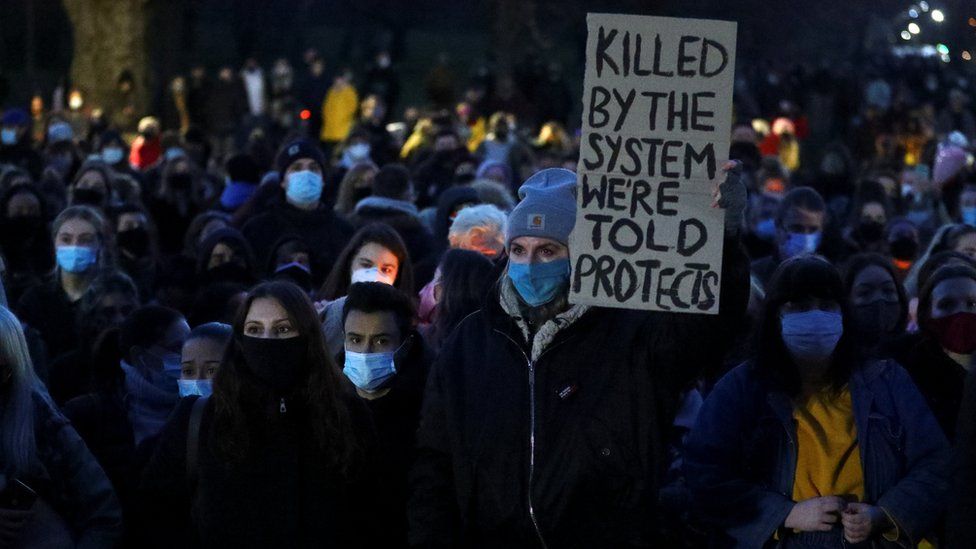 image copyrightReuters
image copyrightReutersSeveral hundred people gathered on Clapham Common on Saturday evening to pay tribute to the murdered 33-year-old - whose death has prompted a public debate over women's safety - despite Covid restrictions.
The official vigil had been called off earlier in the day after organisers said the force had failed to "constructively engage" on how it could be held in a Covid-secure way.
Organisers Reclaim These Streets had urged mourners to light candles and shine other lights on their doorsteps at 21:30 GMT - to coincide with the time Ms Everard was last seen on 3 March.
One video posted online from the vigil at Clapham Common showed officers removing women who were standing by the bandstand.
Cries of "shame on you" and "let them go" could be heard from onlookers. The video showed them being put in a police van and driven away.
Jamie Klingler, from Reclaim These Streets, which had been organising the official vigil, said the event would have been "a lot safer" if it had been held officially, adding the group had 50 stewards who were "trained and ready to go".
Police said four arrests were made at the vigil to "protect people's safety".
"We told the Met that it was going to be worse if we didn't have the organisation that we already had planned that was Covid-safe," she said.
The group added in a statement that it was asking Dame Cressida "to meet us urgently" to explain the actions taken by police.
The Met defended its response to the vigil, saying it was the "only responsible thing to do" to ensure public safety. But the force added that a review will be carried out to see if "lessons can be learned".
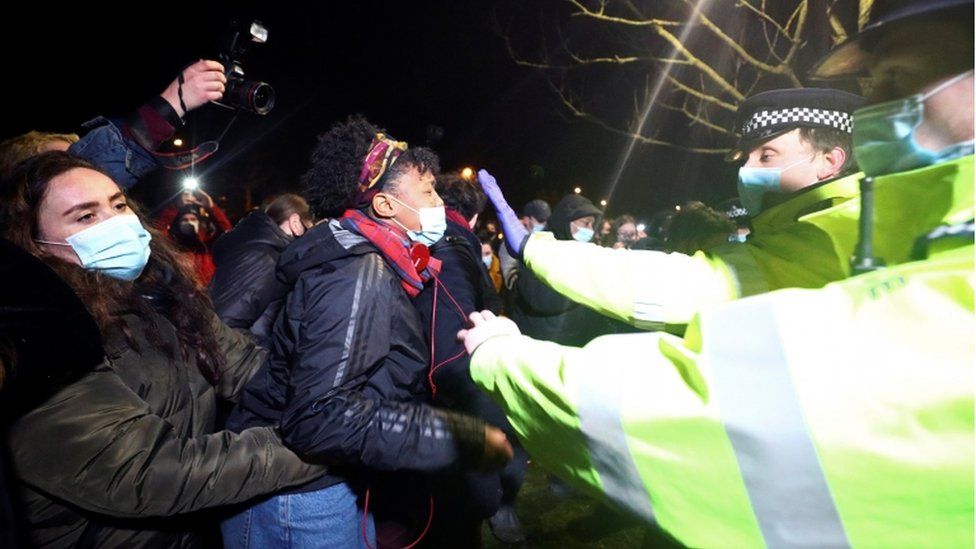 image copyrightReuters
image copyrightReuters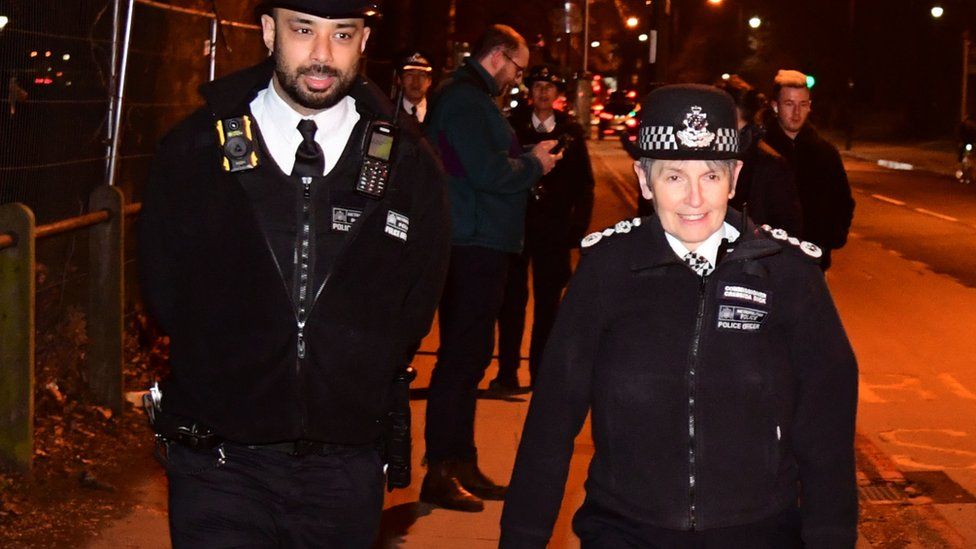 image copyrightPA Media
image copyrightPA MediaHome Office minister Victoria Atkins told the BBC's Andrew Marr Show the scenes were "incredibly upsetting", adding that it was "right" the force "explain their actions - both to the democratically elected politicians and the public".
She told Sky News the government hopes to be "hearing explanations" from Dame Cressida "in the hours and days to come".
Asked whether the Met Police commissioner should leave her post, Ms Atkins added: "I really, really want to support the home secretary in her request to have a report from Cressida.
"The police have got a tough job in policing the coronavirus pandemic more generally at the moment."
Labour's shadow domestic violence minister, Jess Phillips, said the force had "got it wrong at every single turn".
She told the BBC's Andrew Marr Show: "There are a million ways that could have been organised, but the police put their foot down before they put their boot in and at every stage they made the wrong call."
Sadiq Khan, the Labour Mayor of London, said the scenes were "unacceptable" and that he was "urgently seeking an explanation" from the commissioner.
Victims Commissioner for England and Wales Dame Vera Baird QC said there was no real prospect of police successfully intervening in the crowd in Clapham on Saturday night, describing the circling of the bandstand as "quasi military".
Labour leader Sir Keir Starmer said the scenes were "deeply disturbing", while Liberal Democrat leader Sir Ed Davey has called for Commissioner Dame Cressida to resign.
Conservative MP Caroline Nokes, who chairs the Commons Women and Equalities Select Committee, tweeted.: "In this country we police by consent - not by trampling the tributes to a woman who was murdered and dragging other women to the ground. Badly misjudged by #metpolice."
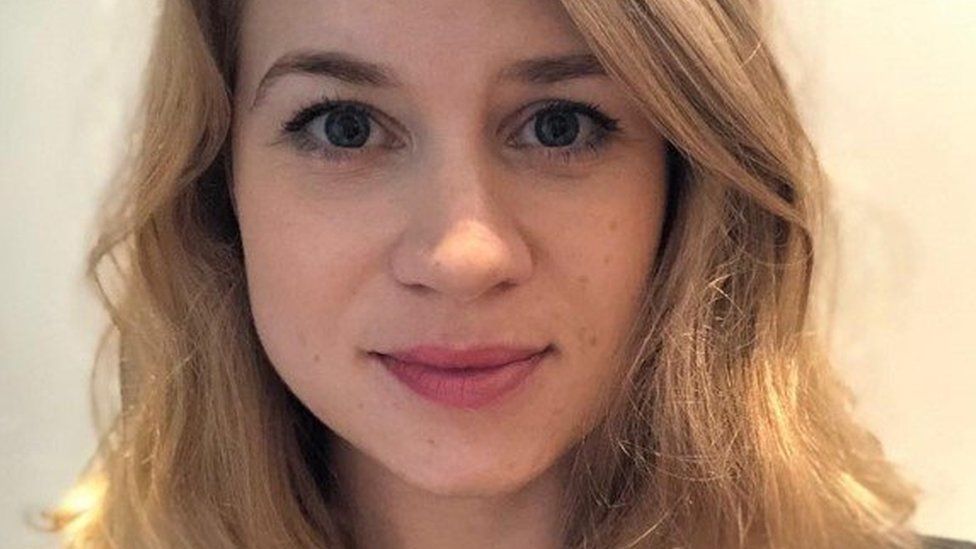
Delivering a statement in the early hours of Sunday, Met Assistant Commissioner Helen Ball said hundreds of people were "packed tightly together", posing a risk of transmitting Covid-19.
"Police must act for people's safety, this is the only responsible thing to do," she said in a statement.
"We absolutely did not want to be in a position where enforcement action was necessary. But we were placed in this position because of the over-riding need to protect people's safety."
On Sunday, people continued to visit the bandstand on the common to pay their respects to Ms Everard.
The BBC's Emily Unia, who has been at the scene, said there had been a "steady stream" of people visiting who had laid flowers and lit candles and stopped for a "moment of reflection".
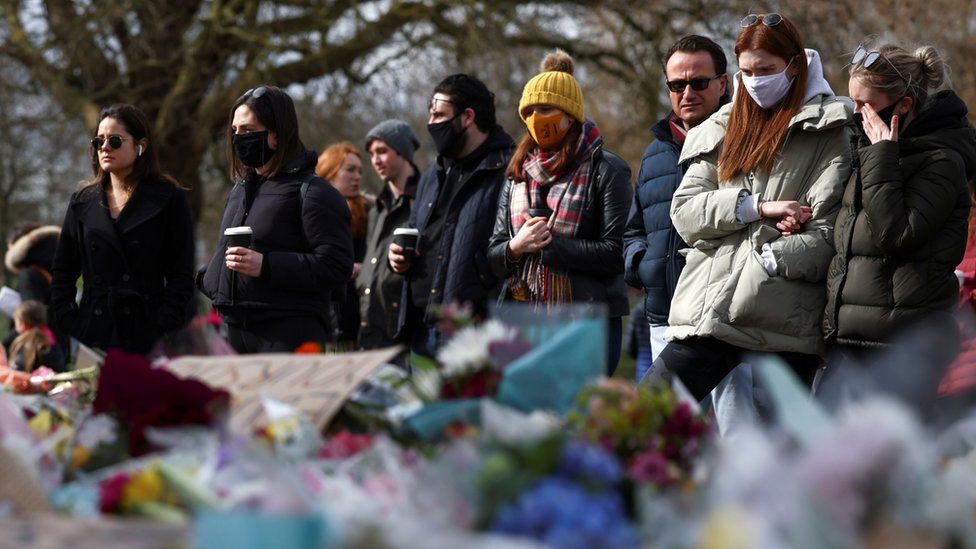 image copyrightReuters
image copyrightReuters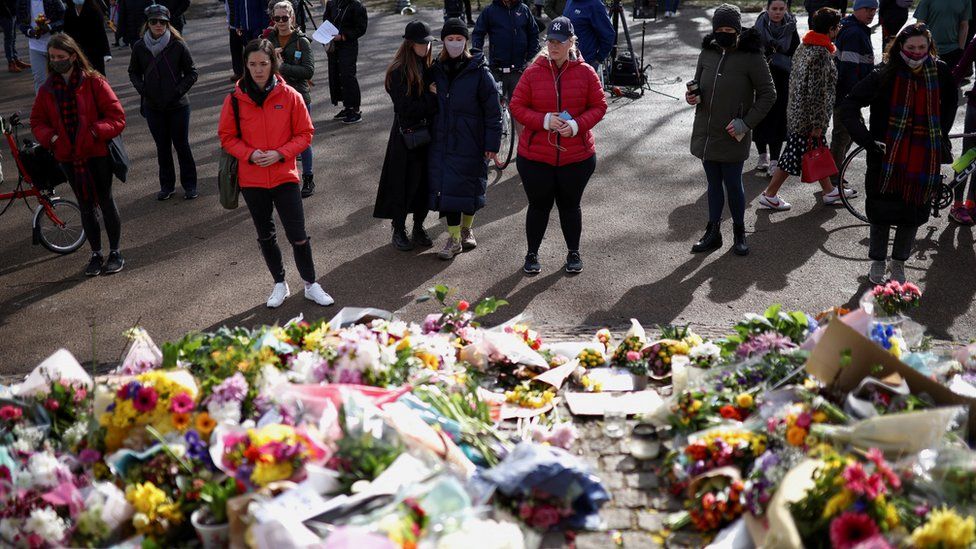 image copyrightReuters
image copyrightReuters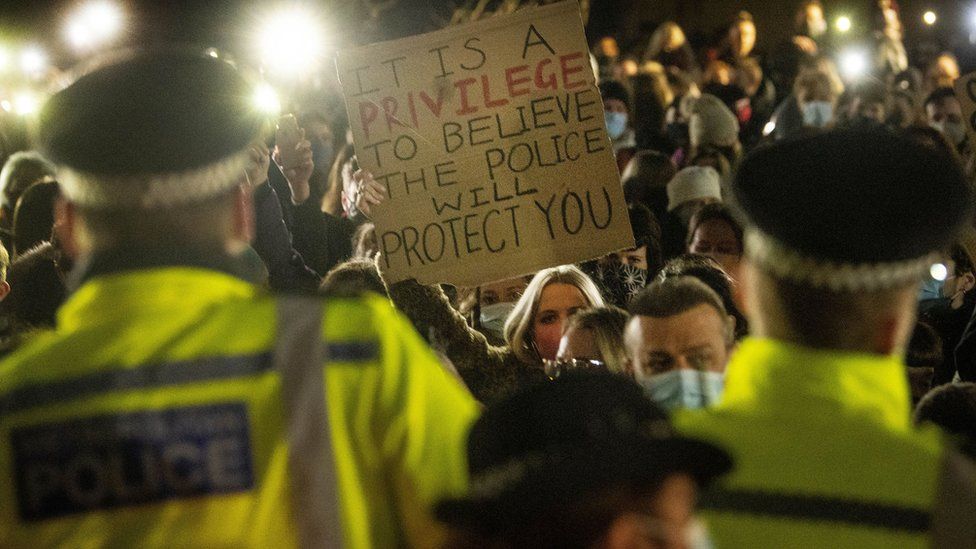 image copyrightPA Media
image copyrightPA Media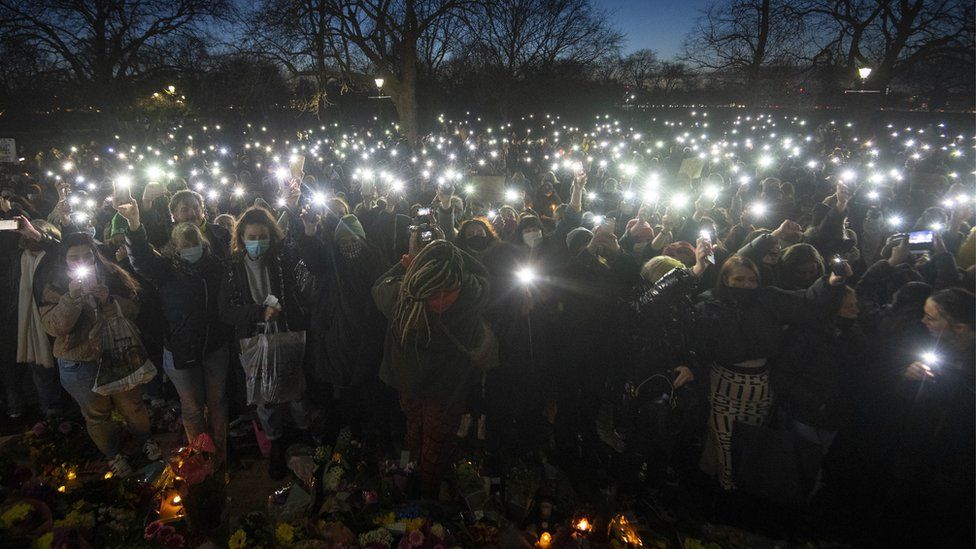 image copyrightPA Media
image copyrightPA MediaAmong those who took part in the doorstep vigil were Prime Minister Boris Johnson and his fiancée, Carrie Symonds, who lit a candle and placed it in front of No 10.
Scotland's First Minister Nicola Sturgeon tweeted a picture of a candle in her home, while Wales's First Minister Mark Drakeford encouraged people to "ignite a fire for change".
Over the course of Saturday people had visited the bandstand on Clapham Common to lay flowers and pay their respects.
The Duchess of Cambridge made a private visit on Saturday afternoon, and was seen pausing at the bandstand.
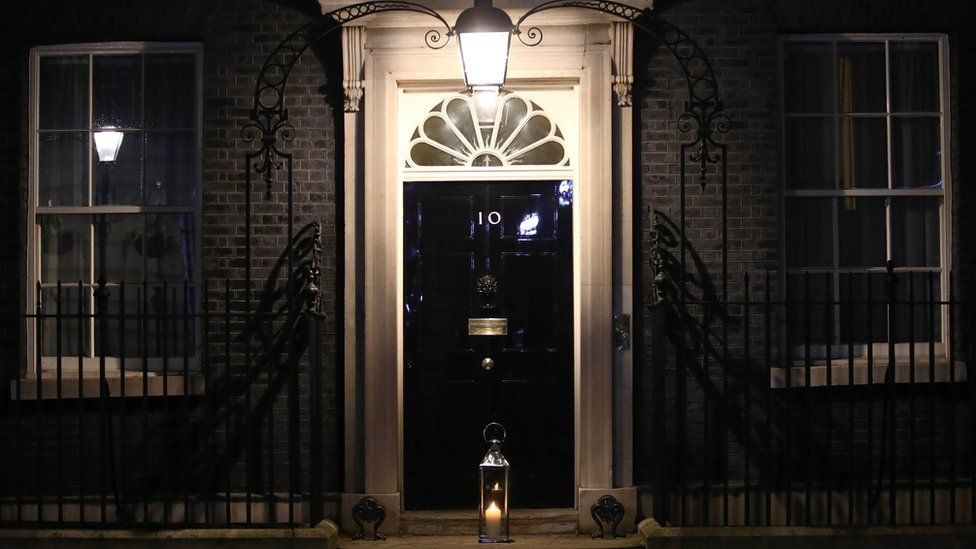 image copyrightPA Media
image copyrightPA MediaEarlier on Saturday, Met Police officer Wayne Couzens, 48, appeared at Westminster Magistrates' Court charged with Ms Everard's kidnap and murder.
The 33-year-old disappeared when walking home to Brixton from Clapham in south London on 3 March.
Mr Couzens was remanded in custody to appear again at the Old Bailey on 16 March.

What are the rules on gatherings in England?
- Under the current lockdown rules two people can meet for recreation outside, which can include "coffee on a bench"
- From 29 March people will be allowed to meet outdoors, either with one other household or within the "rule of six"
- Police can break up illegal gatherings and issue fines of £10,000 to someone holding a gathering of more than 30 people
- During last year's restrictions, when Black Lives Matter and anti-lockdown demonstrations took place, police took a hands-off approach to protests


Have you been affected by any of the issues raised? You can get in touch by emailing haveyoursay@bbc.co.uk.
Please include a contact number if you are willing to speak to a BBC journalist. You can also get in touch in the following ways:
- WhatsApp: +44 7756 165803
- Tweet: @BBC_HaveYourSay
- Upload pictures or video
- Please read our terms & conditions and privacy policy



No comments